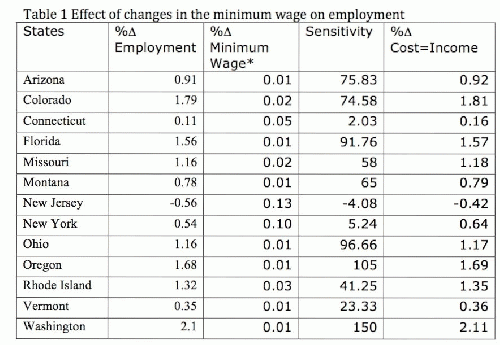House Speaker John Boehner on the delay in voting on the federal minimum wage asserted that increasing the minimum wage is a job killer. He strongly disagrees with President Obama's push to raise the minimum wage from $7.25 an hour to $10.10 an hour: Boehner is alleged to have said, "I rather commit suicide than vote for a minimum wage" (See: The Hill), noting that the Congressional Budget Office found it would cost 500,000 jobs. However, according to CEPR-Center for Economic and Policy Research, 13 (nine increases were automatic; four voted on) states that have increased their minimum wage have seen corresponding increases in their employment. Can both these contradictory outcomes be true? Yes, they can. That is because they are "time sensitive". In the immediate term, right now, a rise in the minimum wage will really not change employment--you are likely to be fired tomorrow, you are valuable to the business that cannot substitute a machine for you. But in the long haul you can be replaced by automation in some industries. For instance, full service at the gas pump went the way of the dodo--you pump your own gas; ushers in cinemas have disappeared--you seat yourself.
When the minimum wage is raised it sends off a ripple in the economy that has far-reaching effects on the cost of doing business, employment, and income. In the short term, costs and income go up; then long-term employment changes. To evaluate these three things: costs, income, and employment, we need to understand some relationships. One of these is the relationship between wages and employment--this relationship is negative; i.e., higher wages are hiring disincentives. In other words, we want to know how sensitive are hiring (firing) practices to changes in wages--sensitivity here runs the gamut from zero to infinity. The next piece of the analysis derives from the first--wages denote both a cost to business (they want to keep low) and income (to workers who have a high inclination to spend). Suppose for illustrative purposes the wage/hiring sensitivity for different industries are 0, 1, 2. If it is 0 and you increase wages by one percent, hiring will not change, so the firm's cost will rise by the amount of the wage increase but employment will remain the same; if sensitivity is 1 and you raise wages by one percent, the firm might cut its worker force by one percent, so its costs will not change; finally, if sensitivity is 2 and wages increase by one percent, the firm would let go two percent of its workers, so it will reduce its costs. Between zero and one sensitivity, an increase in the minimum wage would make workers better off. For instance, if it were .5 and wages increased by one percent, then the drop in hiring would be .5 percent--the remaining workers would have more money to spending in the economy.
Ironically, Speaker Boehner's job-killer assertion, alluded to above, has a home in economic thinking. It is based on the nation that if you increase the cost of something, you discourage its use. That is, incentive matters. Yet, there is evidence that the latest round of minimum-wage increases in 13 states did not depress employment--employment rose. This is a perverse effect!

Source: Center for Economic and Policy Research (Ben Wolcott, 30 June 2014).
(Image by Computed by S. Patterson from Huff Business, July 10, 2014. Title: '13 States Raise their Minimum Wage for the New Year.') Details DMCA
The column labeled "Sensitivity" indicates that employment is strongly sensitive to changes in the minimum wage. The data in the column labeled "percentage change (%) in Cost=Income" denote the effects of a minimum-wage increase on income in each of the 13 states listed in Table 1, which also shows the collective effects of the minimum-wage increase of the broader US economy. These are in a sense unexpected results. How can a disincentive such as a rise in the minimum wage lead to higher employment and income? A definitive answer to that question is evasive--there are just too many variables. Yet, these positive results of higher minimum wages suggest President Obama might be on to something by pushing to raise the federal minimum wage to $10.10. The results might also inspire a recalcitrant Congress to pass legislation raising the minimum wage. Some businesses have decided that it is good for them to pay their workers more than the minimum wage. Starting hourly minimum wages for some firms are: Gap ($9), IKEA ($10.76), Costco ($11.40), Whole Foods ($11), In-N-Out ($10.50), Ben-&-Jerry's ($15.97), Trader Joe's ($13.29), and Zappos ($16). (See: New York Post) In other words, these companies are paying their workers more than they are required by law. Why? This phenomenon is what economists call "efficiency wage" and there are many reasons for it--it reduces employment turnover and worker productivity. A Forbes piece gives an excellent answer to the question why some companies pay their workers the efficiency wage. The problem with the minimum wage: Empirical evidence (science, if you will) seemingly has no impact on the workings of our congressional representatives--some openly pooh-pooh evidence or at the very least are unimpressed by it. For political consideration or strategic benefits, the Congress will not be moved to raise the minimum wage regardless of the president's jawboning efforts. Here politics trumps economics!




